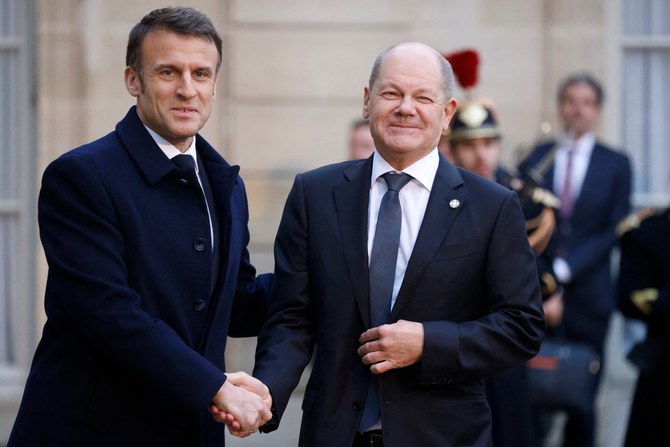Khaled Abou Zahr
Tensions between France and Germany, and clearly between President Emmanuel Macron and Chancellor Olaf Scholz, are starting to show a historical break from what was the pillar of the European construction: the Franco-German engine. We are now far from the closeness of President Charles de Gaulle and Chancellor Konrad Adenauer or President Francois Mitterrand and Chancellor Helmut Kohl. In dangerous geopolitical and military times, these strains are putting at risk the entire stability and security of Europe. In fact, the war in Ukraine is only the tip of the iceberg of conflicting views over the future of Europe.
When it comes to Ukraine, the disagreement over the supply of Taurus missiles and Macron’s suggestion of sending Western troops to the front has strained Franco-German relations even more. This has led to accusations from France that Germany is not contributing enough to supporting Ukraine, while Germany is accusing Macron of taking unilateral decisions.
The recent leak of a recording of four senior German military officers indicates that, despite Scholz’s declarations, the prospect of supplying Ukraine with long-range cruise missiles is being considered. The officers were heard saying that the weapons could be used to hit the Kerch Bridge, which links Russia to the peninsula of Crimea. Moreover, a recent French press report indicated that Germany’s increased arms supply to Ukraine has positioned Berlin as the second-largest supplier of arms to Kyiv after the US and this contrasts with or even defies the French accusations. In reality, France lags far behind in 14th place in terms of supplies to Ukraine.
These open dissensions over Ukraine have been a long time coming and are all interlinked with a broader and deeper difference in vision, from the economy and energy to security and defense. Energy is a key element of this confrontation. Although Paris and Berlin finally reached an agreement on the method of setting the price paid per megawatt-hour of electricity at a summit in Hamburg last year, the two countries continue to advocate for two conflicting energy models.
While France has a proven track record of efficiently using nuclear energy as a dependable source, Germany has shut down its nuclear power plants and advocates for an exclusively renewable energy mix. However, it is clear that the German model is not currently working. Indeed, as a result of the war in Ukraine, Berlin has lost its access to cheap natural gas from Moscow. This has been an unprecedented shock for energy-intensive German industries, which have long been the manufacturing powerhouse of Europe. While it continues to try and boost its renewable energy mix, Germany is now focusing on liquefied natural gas, transported by ship, which produces more greenhouse gas emissions and shows how the blind agenda on renewables has put Europe at risk.
With this energy clash, the German model of economic excellence has come undone. This has validated the decade-old comments by French economists that, since the launch of the euro, Germany’s industry has been indirectly subsidized due to the strength of the Deutsche Mark, which allowed it to push its exports and grow its economy at the expense of other members.
Today, while France’s economy is growing, Germany’s is contracting. Yet, on the other hand, Germany has been much more careful when it comes to public debt and fiscal policy. France’s public debt has skyrocketed to more than €3 trillion ($3.28 trillion) – 112.5 percent of gross domestic product, compared with less than 100 percent in 2019. The annual budget deficit is about 5 percent of GDP, way above the 3 percent deficit ceiling set by Brussels.
In contrast, Germany’s public debt, despite also increasing to €2.5 trillion, is only expected to be 63.5 percent of GDP by the end of 2024, far below France’s level. Moreover, Germany’s consolidated fiscal balance recorded a deficit equal to 2.1 percent of its nominal GDP in December, which is in line with Brussels’ ceiling. And while Berlin is looking to force countries to abide by this ceiling, France opposes it. And so, if Germany is the sick man of Europe today, as many journalists are happy to coin it, then France is the bad student looking to benefit from the good student’s ratings.
When it comes to defense, Berlin and Paris indirectly accuse each other of searching for extra gains from their industrial partnership. On that note, press reports indicate that Berlin was behind the Italian government’s veto of a planned $1.8 billion acquisition of Italy’s Microtecnica by French group Safran. And, from a more strategic perspective, German officials accuse France of being hesitant toward NATO and not sufficiently committed to its strategic value. However, this statement is in complete contradiction with Germany’s long-time energy policy, which relied on Russia at the same time as NATO was looking to counter Moscow’s interference.
We could also add to the list of Franco-German differences international relations, which are now closely linked to their defense policies. In fact, all of this is more than a mere clash between the flamboyance of Macron and the discretion of Scholz. It goes beyond the accusations of Macron, who is seeking to seize the opportunity created by the end of Angela Merkel’s historical leadership to become the uncontested European leader, while looking to exploit Central and Eastern European countries to counter Germany. At its core, the issue involves a lack of genuine European political decision-making and a clear EU positioning within the transatlantic alliance. In fact, more than Brexit, these growing tensions are putting at risk the future stability of the EU and hence need to be dealt with immediately.
Arab News







